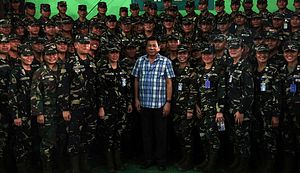Since Philippine President Rodrigo Duterte came to power, there have been concerns about his administration’s distortion of online information raised by his opponents. A recent report provides further evidence of what many see as a worrying development.
According to a recent report released by non-government organization Freedom House, the Philippines is among the 30 countries in the world which deploy some form of “manipulation to distort online information.”
The report cited a University of Oxford study published last July entitled “Troops, Trolls and Troublemakers: A Global Inventory of Organized Social Media Manipulation,” which included the Philippines in the list of countries where cyber troops or troll armies have been deployed by the government.
The report suggests Duterte has a “keyboard army” that inflates popular support for government policies. It said Duterte’s political party hired a social media army composed of about 400 to 500 individuals in the 2016 presidential election campaign.
Though Duterte has admitted that he deployed a team of social media commentators to support his candidacy, his party has denied that it created an online army to boost Duterte’s popularity.
What happened to this online team that actively campaigned for Duterte? Freedom House said members of Duterte’s “keyboard army” were tapped to “amplify the impression of widespread support” for the government, including the brutal and controversial war on drugs (Oplan Tokhang). However, it is not clear whether this cyber army today is directly linked to government offices.
What is clear is that the Duterte government has appointed several bloggers and social media personalities in the government’s communications department. It even gave media accreditation to some pro-Duterte bloggers. Unfortunately, some of these bloggers have been accused of peddling fake news and spreading hateful comments against critics of the Duterte government. Some are criticized for behaving like trolls especially those who think that members of the media are too biased against Duterte.
Responding to the Freedom House report, the Presidential Communications Operations Office (PCOO) said it does not employ a “keyboard army.”
“What President Duterte has are millions of supporters, 16 million of which turned up at polling precincts throughout the land,” the PCOO statement added.
Indeed, many of these supporters are also using the Internet to defend Duterte. Their blind loyalty to Duterte and their aggressive online behavior against government critics are derided as symptoms of being a “Dutertard” (not to be confused with Dotard).
Is there a state-backed “keyboard army” in the Philippines? If anything, the Freedom House report and the earlier study of Oxford should compel Congress to probe if government funds are being used to manipulate information.
Though not all “Dutertards” may be trolls, the public has the right to know if the state is funding the activities of a “keyboard army” which is trolling citizens opposed to Duterte’s war on drugs. Some of these pro-Duterte trolls have become notorious for using fake accounts to harass and attack netizens, journalists, and opposition politicians.
Duterte proved that he understood the changing media landscape when he hired an online team to enhance his winning chances in the 2016 election. As a veteran politician, he is also aware of the importance of delivering his message effectively to strengthen popular support for his government.
Recently, he named a new spokesperson, which indicated that he felt dissatisfied about how his policies are being explained to the public. Though no messenger will be able to convince the public that the war on drugs is succeeding or that it is upholding life and human rights, the naming of a new spokesperson could also mean that the government is open to rethinking its propaganda strategy.
Perhaps Duterte can be persuaded too that the alleged continuing existence of a “keyboard army” is not helping him earn credibility among Internet users. Or that an army dedicated to the spread of fake news, hate speech, and online violence can only lead to greater disunity, cynicism, and low public confidence. Unless of course he relishes the idea of being called the Philippines’ “troll-in-chief.”
































